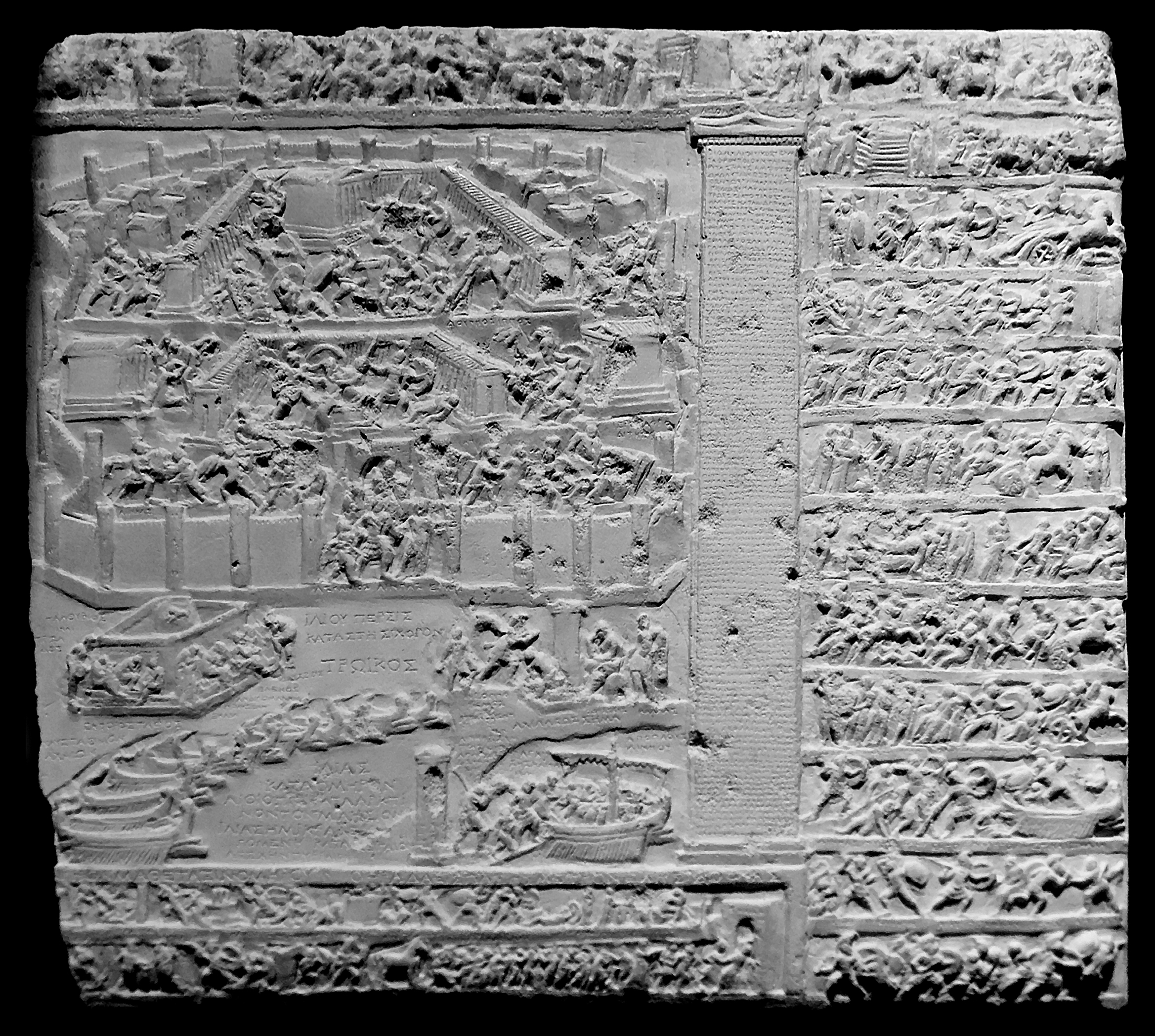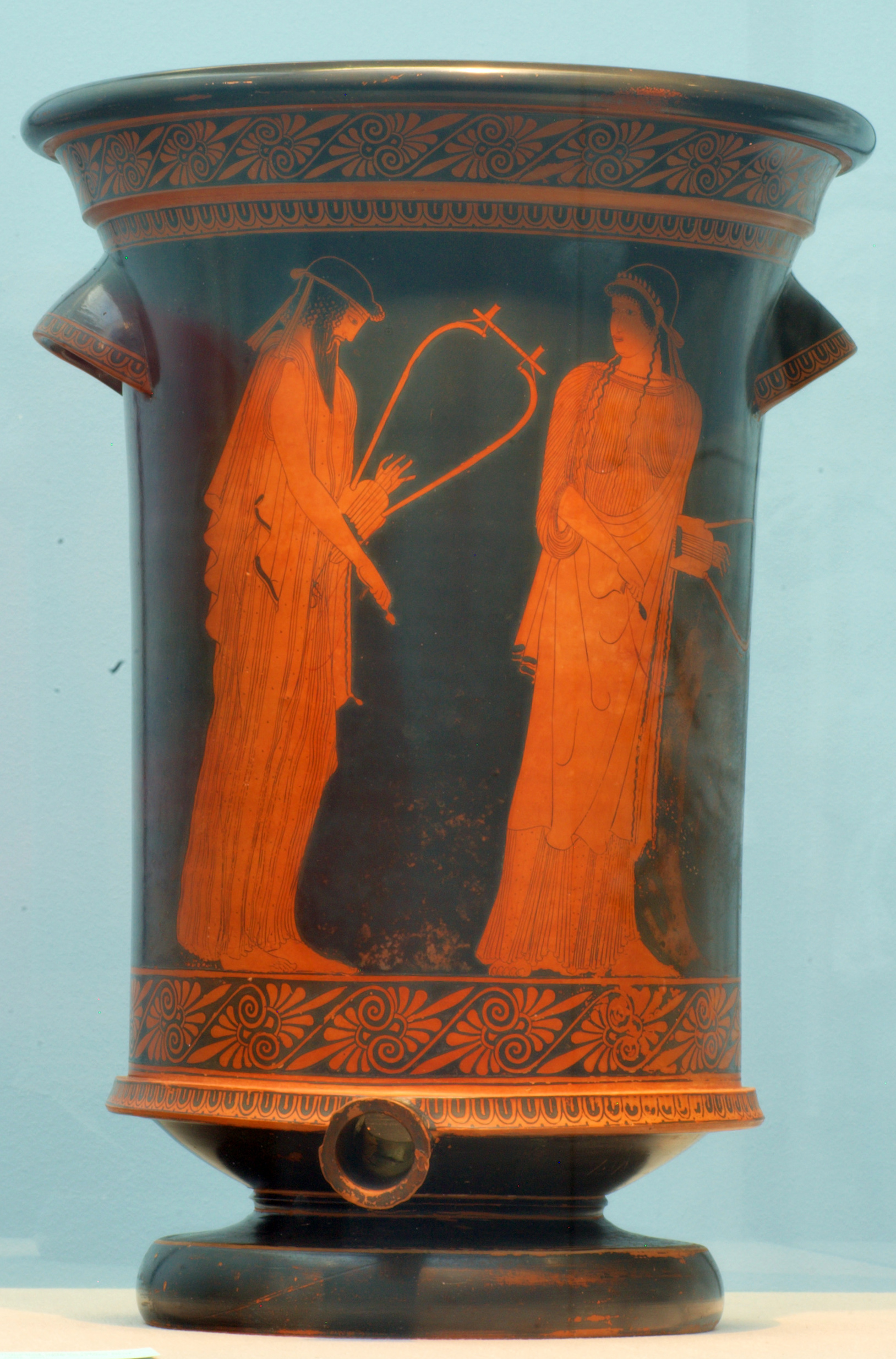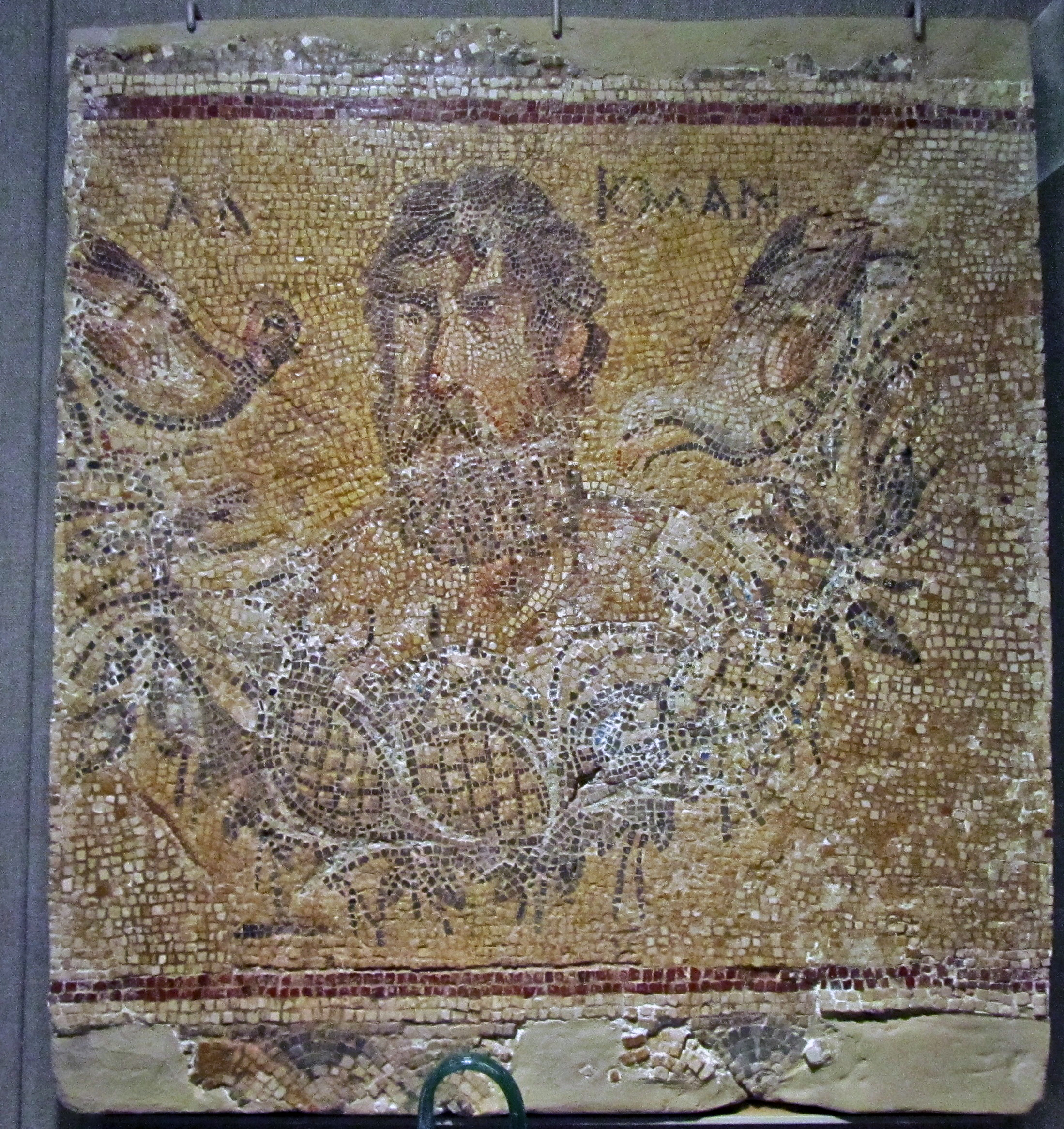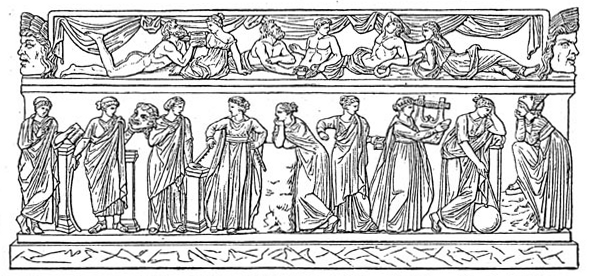|
Stesichorus
Stesichorus (; grc-gre, Στησίχορος, ''Stēsichoros''; c. 630 – 555 BC) was a Greek lyric poet native of today's Calabria (Southern Italy). He is best known for telling epic stories in lyric metres, and for some ancient traditions about his life, such as his opposition to the tyrant Phalaris, and the blindness he is said to have incurred and cured by composing verses first insulting and then flattering to Helen of Troy. He was ranked among the nine lyric poets esteemed by the scholars of Hellenistic Alexandria, and yet his work attracted relatively little interest among ancient commentators, so that remarkably few fragments of his poetry now survive. As David Campbell notes: "Time has dealt more harshly with Stesichorus than with any other major lyric poet." Recent discoveries, recorded on Egyptian papyrus (notably and controversially, the Lille Stesichorus),P.J. Parsons, "The Lille Stesichorus", ''Zeitschreift für Papyrologie und Epigraphik'' Vol. 26 (1977), pages ... [...More Info...] [...Related Items...] OR: [Wikipedia] [Google] [Baidu] |
Lille Stesichorus
The Lille Stesichorus is a papyrus containing a major fragment of poetry usually attributed to the archaic lyric poet Stesichorus, discovered at Lille University and published in 1976. It has been considered the most important of all the Stesichorus fragments, confirming his role as an historic link between genres as different as the epic poetry of Homer and the lyric poetry of Pindar. The subject matter and style are typical of his work generally but not all scholars have accepted it as his work. The fragment is a narrative treatment of a popular myth, involving the family of Oedipus and the tragic history of Thebes, and thus it sheds light on other treatments of the same myth, such as by Sophocles in '' Oedipus Tyrannos'' and Aeschylus in ''Seven Against Thebes''. The fragment is significant also in the history of colometry since it includes lyric verses that have been divided into metrical ''cola'', a practice usually associated with the later career of Aristophanes of Byzant ... [...More Info...] [...Related Items...] OR: [Wikipedia] [Google] [Baidu] |
Helen Of Troy
Helen of Troy, Helen, Helena, (Ancient Greek: Ἑλένη ''Helénē'', ) also known as beautiful Helen, Helen of Argos, or Helen of Sparta, was a figure in Greek mythology said to have been the most beautiful woman in the world. She was believed to have been the daughter of Zeus and Leda, and was the sister of Clytemnestra, Castor and Pollux, Philonoe, Phoebe and Timandra. She was married to King Menelaus of Sparta "who became by her the father of Hermione, and, according to others, of Nicostratus also." The usual tradition is that after the goddess Aphrodite promised her to Paris in the Judgement of Paris, she was seduced by him and carried off to Troy. This resulted in the Trojan War when the Achaeans set out to reclaim her. Another ancient tradition, told by Stesichorus, tells of how "not she, but her wraith only, had passed to Troy, while she was borne by the Gods to the land of Egypt, and there remained until the day when her lord Menelaus, turning aside on the hom ... [...More Info...] [...Related Items...] OR: [Wikipedia] [Google] [Baidu] |
Pindar
Pindar (; grc-gre, Πίνδαρος , ; la, Pindarus; ) was an Ancient Greek lyric poet from Thebes. Of the canonical nine lyric poets of ancient Greece, his work is the best preserved. Quintilian wrote, "Of the nine lyric poets, Pindar is by far the greatest, in virtue of his inspired magnificence, the beauty of his thoughts and figures, the rich exuberance of his language and matter, and his rolling flood of eloquence, characteristics which, as Horace rightly held, make him inimitable." His poems can also, however, seem difficult and even peculiar. The Athenian comic playwright Eupolis once remarked that they "are already reduced to silence by the disinclination of the multitude for elegant learning". Some scholars in the modern age also found his poetry perplexing, at least until the 1896 discovery of some poems by his rival Bacchylides; comparisons of their work showed that many of Pindar's idiosyncrasies are typical of archaic genres rather than of only the poet hims ... [...More Info...] [...Related Items...] OR: [Wikipedia] [Google] [Baidu] |
Greek Lyric
Greek lyric is the body of lyric poetry written in dialects of Ancient Greek. It is primarily associated with the early 7th to the early 5th centuries BC, sometimes called the "Lyric Age of Greece", but continued to be written into the Hellenistic and Imperial periods. Background Lyric is one of three broad categories of poetry in classical antiquity, along with drama and epic, according to the scheme of the "natural forms of poetry" developed by Goethe in the early nineteenth century. (Drama is considered a form of poetry here because both tragedy and comedy were written in verse in ancient Greece.) Culturally, Greek lyric is the product of the political, social and intellectual milieu of the Greek ''polis'' ("city-state"). Much of Greek lyric is occasional poetry, composed for public or private performance by a soloist or chorus to mark particular occasions. The symposium ("drinking party") was one setting in which lyric poems were performed.Miller, ''Greek Lyric: An Anthology ... [...More Info...] [...Related Items...] OR: [Wikipedia] [Google] [Baidu] |
Catania
Catania (, , Sicilian and ) is the second largest municipality in Sicily, after Palermo. Despite its reputation as the second city of the island, Catania is the largest Sicilian conurbation, among the largest in Italy, as evidenced also by the presence of important road and rail transport infrastructures as well as by the main airport in Sicily, fifth in Italy. It is located on Sicily's east coast, at the base of the active volcano, Mount Etna, and it faces the Ionian Sea. It is the capital of the 58-municipality region known as the Metropolitan City of Catania, which is the seventh-largest metropolitan city in Italy. The population of the city proper is 311,584, while the population of the Metropolitan City of Catania is 1,107,702. Catania was founded in the 8th century BC by Chalcidian Greeks. The city has weathered multiple geologic catastrophes: it was almost completely destroyed by a catastrophic earthquake in 1169. A major eruption and lava flow from nearby Mount Etna ... [...More Info...] [...Related Items...] OR: [Wikipedia] [Google] [Baidu] |
Gioia Tauro
Gioia Tauro () is a ''comune'' (municipality) in the Metropolitan City of Reggio Calabria (Italy), on the Tyrrhenian coast. It has an important port, situated along the route connecting Suez to Gibraltar, one of the busiest maritime corridors in the world.Success for Gioia Tauro , undated ADN Kronos report on Italtrade History Gioia Tauro has been continuously inhabited for more than 2500 years. From about 400 BC or so it was inhabited by Greek colonists who called it Matauros or Metauros ( grc, Μέταυρος). write that it was established by Greeks from the Zancle. It was one of th ...[...More Info...] [...Related Items...] OR: [Wikipedia] [Google] [Baidu] |
Sappho
Sappho (; el, Σαπφώ ''Sapphō'' ; Aeolic Greek ''Psápphō''; c. 630 – c. 570 BC) was an Archaic Greek poet from Eresos or Mytilene on the island of Lesbos. Sappho is known for her lyric poetry, written to be sung while accompanied by music. In ancient times, Sappho was widely regarded as one of the greatest lyric poets and was given names such as the "Tenth Muse" and "The Poetess". Most of Sappho's poetry is now lost, and what is extant has mostly survived in fragmentary form; only the "Ode to Aphrodite" is certainly complete. As well as lyric poetry, ancient commentators claimed that Sappho wrote elegiac and iambic poetry. Three epigrams attributed to Sappho are extant, but these are actually Hellenistic imitations of Sappho's style. Little is known of Sappho's life. She was from a wealthy family from Lesbos, though her parents' names are uncertain. Ancient sources say that she had three brothers; Charaxos (Χάραξος), Larichos (Λάριχος) and Eurygios ( ... [...More Info...] [...Related Items...] OR: [Wikipedia] [Google] [Baidu] |
Alcman
Alcman (; grc-gre, Ἀλκμάν ''Alkmán''; fl. 7th century BC) was an Ancient Greek choral lyric poet from Sparta. He is the earliest representative of the Alexandrian canon of the Nine Lyric Poets. Biography Alcman's dates are uncertain, but he was probably active in the late seventh century BC. The name of his mother is not known; his father may have been called either Damas or Titarus. Alcman's nationality was disputed even in antiquity. Unfortunately, the records of the ancient authors were often deduced from biographic readings of their poetry, and the details are often untrustworthy. Antipater of Thessalonica wrote that poets have "many mothers" and that the continents of Europe and Asia both claimed Alcman as their son. Frequently assumed to have been born in Sardis, capital of ancient Lydia, the Suda claims that Alcman was actually a Laconian from Messoa. The compositeness of his dialect may have helped to maintain the uncertainty of his origins, b ... [...More Info...] [...Related Items...] OR: [Wikipedia] [Google] [Baidu] |
Nine Lyric Poets
The Nine Lyric or Melic Poets were a canonical group of ancient Greek poets esteemed by the scholars of Hellenistic Alexandria as worthy of critical study. In the Palatine Anthology it is said that they established lyric song. They were: *Alcman of Sparta (choral lyric, 7th century BC) * Sappho of Lesbos (monodic lyric, BC) *Alcaeus of Mytilene (monodic lyric, BC) * Anacreon of Teos (monodic lyric, 6th century BC) * Stesichorus of Metauros (choral lyric, 7th century BC) * Ibycus of Rhegium (choral lyric, 6th century BC) * Simonides of Ceos (choral lyric, 6th century BC) * Bacchylides of Ceos (choral lyric, 5th century BC) *Pindar of Thebes (choral lyric, 5th century BC) In most Greek sources the word ''melikos'' (from ''melos'', "song") is used to refer to these poets, but the variant ''lyrikos'' (from ''lyra'', "lyre") became the regular form in both Latin (as ''lyricus'') and in modern languages. The ancient scholars defined the genre on the basis of the musical accompanim ... [...More Info...] [...Related Items...] OR: [Wikipedia] [Google] [Baidu] |
Phalaris
Phalaris ( el, Φάλαρις) was the tyrant of Akragas (now Agrigento) in Sicily, from approximately 570 to 554 BC. History Phalaris was renowned for his excessive cruelty. Among his alleged atrocities is cannibalism: he was said to have eaten suckling babies. Phalaris was entrusted with the building of the temple of Zeus Atabyrius in the citadel and took advantage of his position to make himself despot. Under his rule, Agrigentum seemed to have attained considerable prosperity. He supplied the city with water, adorned it with fine buildings, and strengthened it with walls. On the northern coast of the island, the people of Himera elected him general with absolute power, in spite of the warnings of the poet Stesichorus. According to the ''Suda'' he succeeded in making himself master of the whole of the island. He was at last overthrown in a general uprising headed by Telemachus, the ancestor of Theron of Acragas (tyrant c. 488–472 BC), and burned in his own brazen bull. ... [...More Info...] [...Related Items...] OR: [Wikipedia] [Google] [Baidu] |
Calabria
, population_note = , population_blank1_title = , population_blank1 = , demographics_type1 = , demographics1_footnotes = , demographics1_title1 = , demographics1_info1 = , demographics1_title2 = , demographics1_info2 = , demographics1_title3 = , demographics1_info3 = , timezone1 = CET , utc_offset1 = +1 , timezone1_DST = CEST , utc_offset1_DST = +2 , postal_code_type = , postal_code = , area_code_type = ISO 3166 code , area_code = IT-78 , blank_name_sec1 = GDP (nominal) , blank_info_sec1 = €33.3 billion (2018) , blank1_name_sec1 = GDP per capita , blank1_info_sec1 = €17,000 (2018) , blank2_name_sec1 = HDI (2018) , blank2_info_sec1 = 0.845 · 20th of 21 , blank_name_sec2 = NUTS Region , blank_info_sec2 = ITF , website ... [...More Info...] [...Related Items...] OR: [Wikipedia] [Google] [Baidu] |
Cicero
Marcus Tullius Cicero ( ; ; 3 January 106 BC – 7 December 43 BC) was a Roman statesman, lawyer, scholar, philosopher, and academic skeptic, who tried to uphold optimate principles during the political crises that led to the establishment of the Roman Empire. His extensive writings include treatises on rhetoric, philosophy and politics, and he is considered one of Rome's greatest orators and prose stylists. He came from a wealthy municipal family of the Roman equestrian order, and served as consul in 63 BC. His influence on the Latin language was immense. He wrote more than three-quarters of extant Latin literature that is known to have existed in his lifetime, and it has been said that subsequent prose was either a reaction against or a return to his style, not only in Latin but in European languages up to the 19th century. Cicero introduced into Latin the arguments of the chief schools of Hellenistic philosophy and created a Latin philosophical voc ... [...More Info...] [...Related Items...] OR: [Wikipedia] [Google] [Baidu] |










